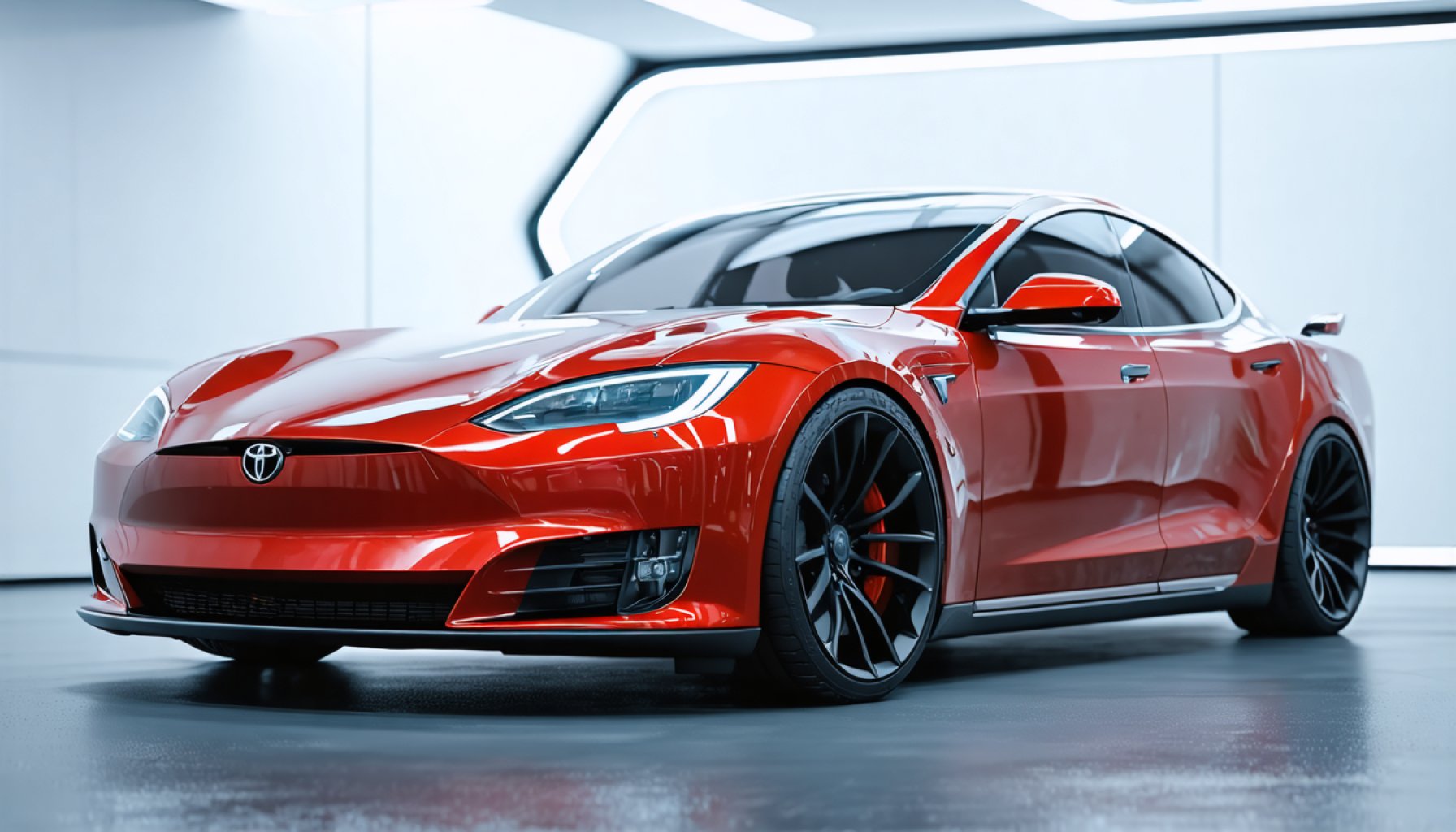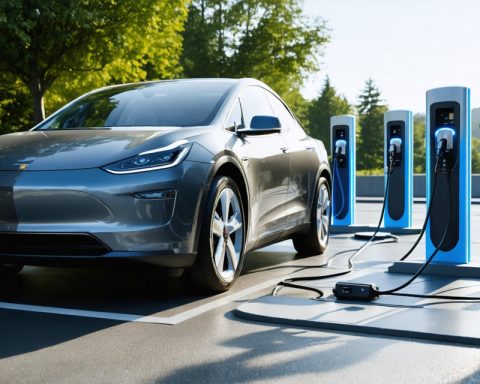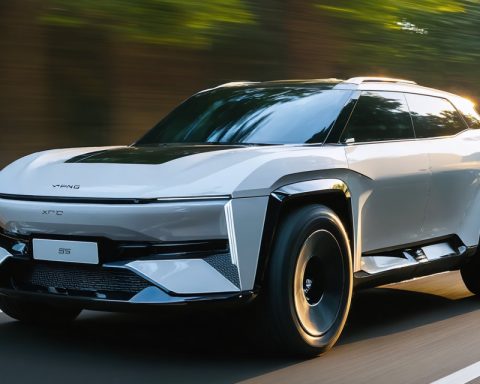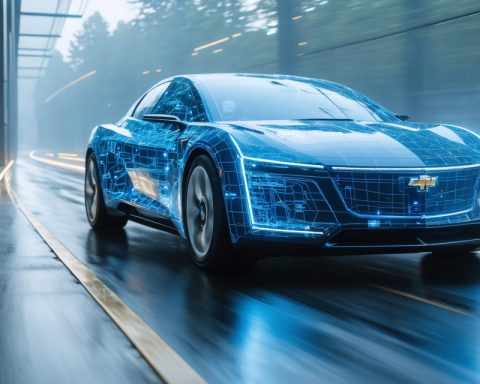- The potential alliance between Toyota and Tesla could blend Toyota’s reliability with Tesla’s cutting-edge battery technology, revolutionizing the automotive industry.
- Tesla’s advanced 4680 battery cells promise faster charging, over 600 miles of range, and extended lifespan features for Toyota’s upcoming EV lineup.
- Concerns arise over Toyota potentially losing its brand identity and Tesla’s market position being diluted by sharing technology.
- The alliance raises strategic questions about Toyota’s commitment to its solid-state battery research versus adopting Tesla’s established EV innovations.
- This partnership may lower EV prices and democratize access to advanced automotive technology as competition intensifies.
- The outcome could redefine mobility and become a pivotal moment in EV history, fueling an unprecedented automotive revolution.
Imagining a world where the formidable might of Toyota joins hands with the electrifying genius of Tesla feels straight out of a sci-fi blockbuster, but the industry buzz hints at an imminent alliance with the potential to transcend fiction. Imagine Toyota’s hallmark reliability supercharged by Tesla’s avant-garde battery technology—a confluence that could shake the very foundation of the automobile industry.
Picture this: the rumble of a Toyota, familiar and trusted, now whisper-silent and boasting the power of Tesla’s groundbreaking 4680 battery cells. These cells promise faster charging, a staggering range surpassing 600 miles, and a lifespan that defies economic cynicism. This monumental partnership could herald an era where Toyota’s upcoming EV lineup doesn’t just pace the industry but leads it—an exhilarating prospect for eco-conscious consumers and automotive enthusiasts.
Yet, trepidation lurks beneath the excitement. Traditionalists within Toyota’s fan base voice concern over whether Tesla’s distinctive technological footprint might overshadow Toyota’s storied brand identity. Simultaneously, Tesla stakeholders express apprehension about potentially diluting the company’s market dominance by sharing its tech-secret sauce with its erstwhile rival. As the stakes rise, the whispers grow louder, leaving everyone on edge about whether this collaboration signifies a mere tactical maneuver or the dawn of a transformative alliance in the automotive landscape.
The overarching question that looms large is whether Toyota will abandon its own significant strides in solid-state battery research, succumbing to Tesla’s established prowess in the EV domain. Could we witness the end of Toyota’s independent innovation path, or will this alliance elevate both giants to unprecedented heights?
From the stock market’s wary watch to consumer enthusiasts awaiting the next breakthrough, this potential partnership carries implications stretching beyond mere corporate synergy. Lower EV prices may dominate the horizon as competition intensifies, potentially democratizing access to cutting-edge automotive technology. For the global populace, accustomed to watching the gradual evolution of electric vehicles, this monumental union could redefine mobility itself, turning a once-speculative whisper into the chorus of a mighty automotive revolution.
As we stand on this precipice, the million-dollar question lingers: Will this alliance become the definitive chapter in Electric Vehicles (EV) history, rewriting the rules and compelling everyone else to catch up, or will it remain an unsubstantiated whisper, forever an echo in the halls of what might have been? One thing is certain: the impending shifts promise to color the roads of the future in hues of surprise, innovation, and ultimately, change.
Prepare yourselves, the automotive world may never be the same again.
Could the Toyota-Tesla Alliance Revolutionize the EV Market?
The Potential Impact of a Toyota-Tesla Alliance
In an automotive landscape ripe for transformation, the possible alliance between Toyota and Tesla could redefine the electric vehicle (EV) industry. By combining Toyota’s legendary reliability with Tesla’s cutting-edge battery technology, this collaboration could transcend traditional boundaries, setting new benchmarks for performance, range, and sustainability.
Key Features and Innovations
– 4680 Battery Cells: Tesla’s 4680 battery cells promise faster charging times, increased range beyond 600 miles, and enhanced durability. Their integration into Toyota vehicles could see a significant leap in EV capabilities, making long-range electric touring a practical reality.
– Toyota’s Reliability: Known for its durable and reliable vehicles, Toyota could bring these strengths to a new breed of electric vehicles, ensuring they are not only high-performing but also long-lasting and dependable.
– Eco-Conscious Innovation: This partnership could accelerate the global shift towards eco-friendly transportation, reducing emissions and making sustainable travel more accessible to a broader audience.
Market Forecast and Industry Trends
The collaboration could precipitate a price war in the EV market, bringing down costs as competition heats up. EV technology might become more democratized, leading to wider adoption across various consumer segments.
– Expansion Opportunities: The partnership could expedite both companies’ expansion into emerging markets, leveraging each other’s infrastructure and distribution channels to capture new audiences.
– Enhanced Consumer Trust: With both companies’ reputations for innovation and quality, a joint offering could gain rapid acceptance, especially among environmentally conscious consumers.
Pressing Questions and Considerations
1. Will Toyota Abandon Its Own Battery Research?
Toyota has been heavily invested in developing solid-state batteries. Whether they will forgo this path in favor of Tesla’s technology remains a key concern. However, a dual-path approach where both technologies are developed could also be a plausible strategy.
2. Brand Identity Concerns:
There’s a potential risk that Tesla’s strong technological footprint could overshadow Toyota’s brand identity. How they manage co-branding efforts will be crucial in maintaining distinct brand appeals.
3. Impact on Market Dynamics:
Will this partnership alter Tesla’s market dominance, or will Toyota simply become a vessel for Tesla technology? Strategic and equitable knowledge sharing will be vital to prevent market monopolization.
Pros and Cons Overview
Pros:
– Combines high-tech innovation with trusted reliability.
– Potential to lower EV costs and increase accessibility.
– Promotes faster adoption of sustainable transport solutions.
Cons:
– Brand identity risks for both companies.
– Possible disruption in existing supply chains.
– Strategic dependency on another entity’s technology.
Actionable Recommendations for Consumers
– Stay Informed: Keep an eye on announcements from both companies to understand better what this will mean for future vehicle choices.
– Evaluate Long-Term Value: Consider the long-term benefits of reliability and advanced technology when making purchasing decisions in the coming years.
– Environmental Impact: Appreciate the ecological benefits of this potential alliance and consider supporting brands contributing to sustainable transportation.
For more on these companies, visit Toyota and Tesla.
Conclusion
The anticipated Toyota-Tesla collaboration holds the promise of innovation and transformation in the EV market. By forging a path towards accessible, eco-friendly transport solutions, these giants could catalyze an industry-wide shift, forever altering the landscape of personal and commercial transportation. Whether a futuristic vision or a tangible reality, the implications are bound to resonate across the globe, painting the roads of the future with innovation, change, and sustainability.















